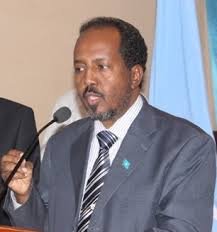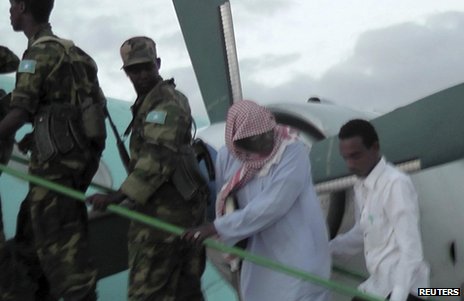WDN Editorial
The capture of Sheikh Hassan D. Aweys on June 26, 2013 in Central Somalia is both a blessing and a curse for the government of Hassan Sheikh Mohamoud. If President Hassan shows an undue leniency towards the apprehended terrorist whom both the West and the Somali populace consider a mother lode of spy information and a “notorious terrorist,” he would discredit his office.
 If the President bends backward to give into the US government’s pressure and extradites Sheikh Aweys to be tried as an international terrorist at US courts, he could risk an open conflict with his Hawiye allies. If on the other hand, he bows down to the pressures coming from some groups in Mogadishu and shows leniency to the terrorist, he could be looking at a souring relationship with Somalis and with the West. Unfortunately, the President is in a bind: Doomed if he does and doomed if he doesn’t.
If the President bends backward to give into the US government’s pressure and extradites Sheikh Aweys to be tried as an international terrorist at US courts, he could risk an open conflict with his Hawiye allies. If on the other hand, he bows down to the pressures coming from some groups in Mogadishu and shows leniency to the terrorist, he could be looking at a souring relationship with Somalis and with the West. Unfortunately, the President is in a bind: Doomed if he does and doomed if he doesn’t.
To avoid such a suffocating trap, he should carefully walk on a tight rope and do what are right with the Somali people first, and then only satisfy the outside interests.
Sheikh Aweys is known to have been on the UN and US terrorist list for the longest time, and his capture carries immense interest for the United States of America and for the rest of the Western nations. But come to Somali society and his case suddenly falls into a gray area of being a hero to some and or a vicious villain. A balance shall be stricken in handling the Aweys matter.
According to US reports, the apprehended terrorist is a top ranking leader of the Al-Qaeda affiliated Al-Shabab group which wrecked havoc in Somalia and East Africa at large. Al-shabab and its associates are accused of masterminding the bombing of US Embassies in Nairobi and Dar Salaam and the killing of many Somalis and other nationals in the course of establishing a Wahabism based Islamic state in Somalia. Also, he is accused of recruiting Somali-American youth from US regions such as Minnesota, Ohio and other cities that boast a large number of Somali immigrants. Some of the youth who were recruited to the Somalia war theater and fought alongside Al-Shabab fighters were killed in Somalia, thus making them the first US citizens to die in the war of terror fighting their own country.
 This brings the case of Sheikh Aweys under the legal jurisdiction of the FBI. The interest which the US attaches to the case of Aweys is more than mere international diplomacy. It is also about US lives that were lost because of the leadership the apprehended Aweys held in the Al-Shabab structure.
This brings the case of Sheikh Aweys under the legal jurisdiction of the FBI. The interest which the US attaches to the case of Aweys is more than mere international diplomacy. It is also about US lives that were lost because of the leadership the apprehended Aweys held in the Al-Shabab structure.
Somalia’s neighboring countries have also deep and existential interest in making sure that Hassan Aweys is prosecuted. Both Ethiopia and Kenya, whose hands are deeply buried in the country’s affairs, have lost the lives of their own citizens in their prolonged conflict with religious radicals in Somalia. Ethiopia has been interested in the death or arrest of Hassan Aweys for obvious reasons, mainly because of his resistance to what the Sheikh calls his “countries invasion by the infidels.” In the case of Kenya, widespread acts of terrorism have been carried inside Kenya by Al-Shabab fighters. Yet, handing this terrorist to both of these countries carries huge political risk for Mogadishu.
Nonetheless, Al-Shabab’s terror acts have negatively impacted the Somali people, particularly those in the South Central regions of the country. Al-Shabab killed innocent people for too long, bombed population centers inside and outside Mogadishu, killed students while at graduation ceremony, cut limps and arms for minor “infractions,” and literally made governance impossible in much of the country.
So far the president of Somalia mishandled the issue. When the apprehended prisoner was reported, the Federal Somali Government should have immediately owned the situation and should have approached the matter as a national security and public safety issue. Instead, it sent clan leaders and former warlords at an exorbitant cost to serve as intermediary negotiators on the prisoner’s status. The government’s approach complicated what was a simple issue of a prisoner who was captured after fleeing his own terror group. The government should have apprehended with no conditions set for his surrender.
The government’s initial mishandling of the matter is now shaping what was a terrorist case into a clan cause. His Hawiye sub clan now feels that one of its heroes is being humiliated by their own government. However, there are millions of innocent Somalis who would want to see him prosecuted in a fair trial.
Recommendation: We at WardheerNews
1- Urge that the government should not make the case of apprehending Sheikh Aweys a clan affair. On the contrary, this matter is a national security and public safety matter, as well as a diplomatic issue, and as such should be handled it as a national matter. The earlier mistake of managing the issue as a clan project has already complicated what was simply the case of an apprehended terrorist.
2- Affirm that Sheikh Aweys is first and foremost a Somali citizen who harmed his own people, therefore is accountable to the people of Somalia. If he is going to be tried in a fair court of law, it must be inside Somalia with international observers and court monitors at hand. We encourage the government of Somalia to exercise its sovereign rights and keep, investigate, and apprehend Sheikh Aweys as a Somali national.
3- Discourage to hand over the prisoner to any third party be they US government, Ethiopia or Kenya. As long as the Sheikh is a Somali citizen, he must be tried by his own peers and in his own soil. Doing otherwise would violate the rights of the prisoner.
WardheerNews
Email: Admin@wardheernews.com


Leave a Reply